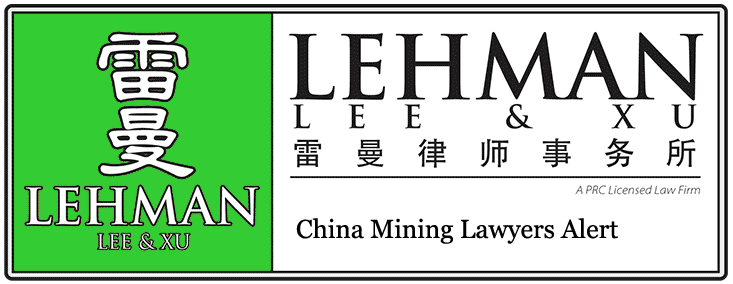
| If you would like us to send you new issues by e-mail each month, please click here to subscribe. There is no charge for this service. If not, please click here to unsubscribe (Please provide the correct Email address which you received our message or forward the message which you received to us for further process). |
 |
|
LEHMAN, LEE & XU China & Mongolian Lawyers
|
|
China Mining Lawyers Alert
|
|
August 2012
|
The China Law News keeps you on top of business, economic and political events in the China. |
|
|
|
In the News |
China plans index for rare earth metals |
CHINA, the world's top rare earth producer, plans to establish a global authoritative pricing index for rare earth metals in an effort to enhance its pricing power over the resources, a leading domestic producer said yesterday.
|
Nation launches trading platform for rare earths in pricing move |
CHINA yesterday launched a physical trading platform for rare earth metals as part of its efforts to regulate the sector and strengthen its pricing power for the resources. The Inner Mongolia Baotou Steel Rare-Earth (Group) Hi-Tech Co, China's top rare earth producer, and nine other firms and institutions jointly launched the platform with a total investment of 100 million yuan (US$15.7 million). Each shareholder invested 10 million yuan and holds a 10 percent stake in the exchange. The rare earth trading platform is located in Baotou City of north China's Inner Mongolia Autonomous Region, home to more than half of the world's light rare earth output. Previously, China's rare earth market was largely opaque, as transactions were not made in public markets and always ran in small volumes. Only limited amounts of pricing and transaction data have been made available to the public. The opaque market and the fact that Chinese rare earth producers far outnumber foreign consumers have weakened China in terms of price negotiations with foreign consumers, analysts said. Ma Pengqi, a rare earth expert and former director of the Baotou Rare Earth Research Institute, said the trading platform will provide clarity and give China more say in deciding rare earth prices. Some analysts, however, questioned the exchange's ability in stabilizing prices. Liang Xingfang, general manager of Baotou Ruixin Rare-Earth Metal Material Co, said the spot market's role in stabilizing rare earth prices is limited. "We have to wait and see how the exchange will work in the future," he said. As the world's largest producer of rare earth metals, China now supplies more than 90 percent of the global demand for the metals, although its reserves account for just 23 percent of the world's total. Rare earth metals, a group of 17 metals, are vital for manufacturing high-tech products ranging from smartphones and wind turbines to electric car batteries and missiles. Mining the metals greatly damages the environment. In recent years, China has come down heavily on illegal mining and smuggling, cut export quotas and imposed production caps and stricter emission standards to control environmental damage and stave off resource depletion. However, these measures have irked rare earth importers, who complain about rising prices and strained supplies. The United States, Europe and Japan in March filed a complaint to the World Trade Organization against China's export policies on rare earths and two other metals. The WTO formed a panel last month to investigate the complaints.
|
|
|
|
|